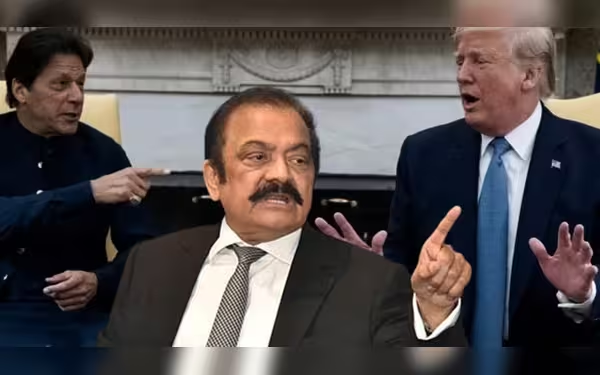Saturday, November 16, 2024 08:53 PM
Rana Sanaullah Labels Trump a Liar, Compares Him to Imran Khan
- Rana Sanaullah calls Trump a liar on live TV.
- Comparison made between Trump and Imran Khan.
- Sanaullah discusses potential US-Pakistan diplomatic relations.
 Image Credits: dailypakistanen
Image Credits: dailypakistanenRana Sanaullah criticizes Donald Trump, comparing him to Imran Khan amid political tensions in Pakistan.
In a recent political discourse, Rana Sanaullah, the Special Assistant to the Prime Minister on Political Affairs, has made headlines by labeling US President-elect Donald Trump as a liar. This bold statement was made during a prime-time television show, where Sanaullah drew a striking comparison between Trump and Imran Khan, the founder of Pakistan Tehreek-e-Insaf (PTI). Both leaders, according to Sanaullah, share a tendency to spread misinformation, mock their opponents, and undermine institutions to cling to their political power.
Sanaullah highlighted the January 6 Capitol riot as a significant example of Trump's controversial political actions. This event, which shocked the world, serves as a testament to the lengths some leaders will go to maintain their influence. The comparison to Imran Khan is particularly poignant, given the current political climate in Pakistan, where Khan faces numerous legal challenges and increasing scrutiny.
When questioned about the possibility of the Pakistani government considering the release of Imran Khan at the behest of the United States, Sanaullah expressed uncertainty. He stated, "I do not foresee such a request," indicating that while diplomatic relations are crucial, the dynamics of this situation are complex. However, he did mention that if the US were to formally request Khan's extradition, he would support a potential swap involving Aafia Siddiqui, a Pakistani neuroscientist imprisoned in the US.
Furthermore, Sanaullah dismissed the congratulatory messages sent to Trump by Pakistani leaders as mere diplomatic formalities, devoid of any substantial political significance. This perspective sheds light on the often transactional nature of international relations, where gestures may not always reflect genuine sentiments.
As political uncertainty looms over Pakistan, with Imran Khan's legal troubles and rising tensions within the political landscape, Sanaullah's comments resonate with many observers. They highlight the intricate web of politics that connects leaders across the globe, revealing how local issues can intertwine with international relations. In a world where information is often manipulated for political gain, it is essential for citizens to remain vigilant and critically assess the narratives presented to them.













